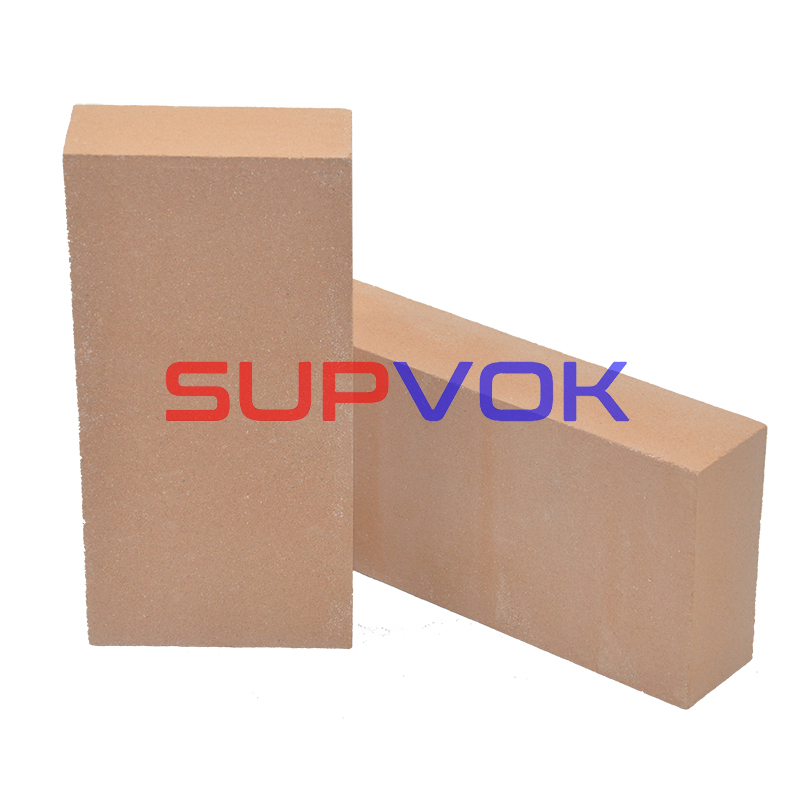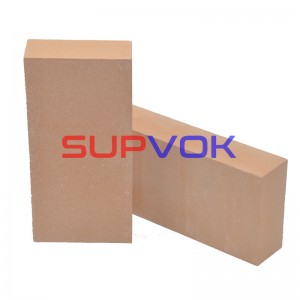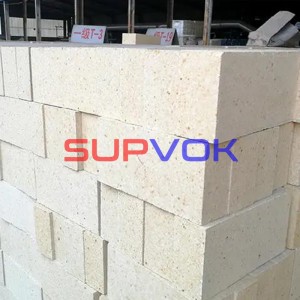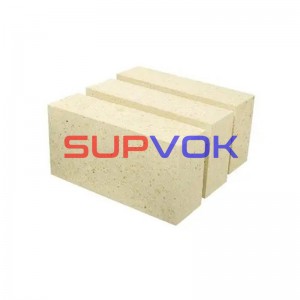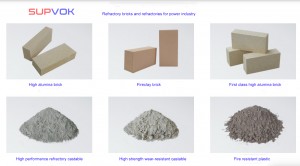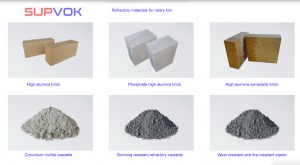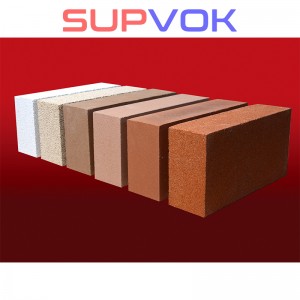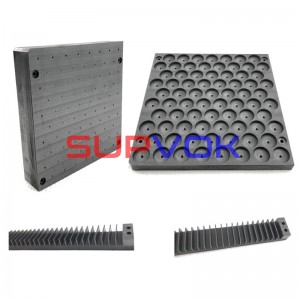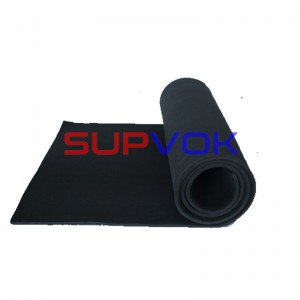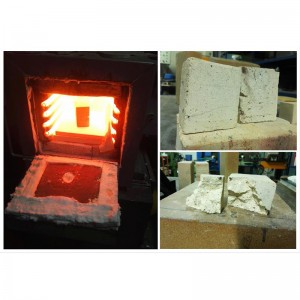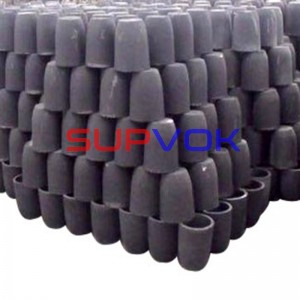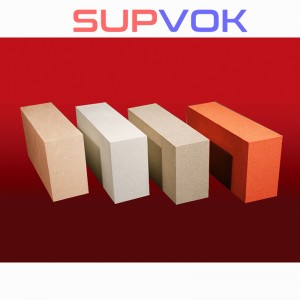High alumina refractory brick
Application
|
Refractory bricks |
Classification |
Material |
Fire-resistance temperature |
Volume density |
Compressive strength |
Applications |
|
refractory fireclay block |
AL2O3≤45% |
Fireclay |
1780 |
1 |
8 |
Light clay bricks are mainly used as thermal insulation materials in various kinds of industrial kilns, such as thermal boilers, glass kilns, cement kilns, chemical fertilizer gas making furnaces, blast furnaces, hot blast furnaces, coking furnaces, electric furnaces, etc. |
|
High purity alumina hollow ball brick
Zirconia hollow ball brick |
AL2O3≥85 |
AL2O3 |
1680 |
1.4~1.7 |
≥12 |
It can be directly contacted with the working layer of the flame or used as the thermal insulation layer. At present, it has been widely used in ceramics, refractory firing kilns, powder metallurgy sintering furnaces, semiconductor component firing kilns, kilns with hydrogen and reducing atmosphere, etc |
|
AL2O3≥90 |
AL2O3 |
1700 |
1.4~1.7 |
≥10 |
||
|
AL2O3≥99 |
AL2O3 |
1800 |
1.4~1.7 |
≥9 |
||
|
ZrO2≥98 |
ZrO2 |
2200 |
3 |
≥8 |
||
| Mullite insulation brick | Fireclay | Mullite |
1400 |
1 |
4.5 |
The normal temperature compressive strength is 70~260MPa. It is mainly used for hot blast furnace top, blast furnace stack and bottom, glass furnace regenerative chamber ceramic sintering kiln, blind corner lining of petroleum cracking system, etc |
KSINO is committed into independent R&D and innovation of high-temperature kiln products, as well as providing high-quality products for high-temperature kilns. In terms of circulating fluidized bed boiler, vaporizer, fluidized bed furnace, garbage incinerator, rotary kiln and other types of furnace structures, it has advanced optimization concepts. KSINO has accumulated rich experience in furnace construction, design, improvement, construction, drying and insulation, and formed a service chain throughout the whole life cycle of high-temperature kilns. KSINO mainly produces heavy shaped, amorphous, light shaped, amorphous furnace refractories, refractory bricks, etc. The products have been widely used in glass, power, metallurgy, non-ferrous, petrochemical, building materials, rotary kilns and other fields.
Japan JIS industrial standard thermal insulation brick has light weight, low iron content, low refiring shrinkage, low thermal conductivity, low heat capacity, low impurity content, high strength, and has good thermal shock resistance and atmospheric corrosion resistance, high dimensional accuracy Excellent characteristics. Products are widely used in industrial furnace hot surface lining, such as annealing furnace, carbonization furnace, tempering furnace, oil refining heating furnace, cracking furnace, roller furnace, tunnel furnace and other industrial furnace backing insulation materials.
This series of products is suitable for the temperature range of 900℃~1500℃.
Physical and chemical indexes of Japanese JIS standard insulating bricks
|
Type |
The reheating permanent wire does not change by more than 2% of the test temperature |
Bulk density ㎏/㎝3 |
Compressive strength
㎏f/cm2 (MPa) |
Thermal conductivity (average temperature 350±10℃) kca/m·h·℃ (W/m·k) |
|
|
A |
A-1 |
900 |
<0.50 |
≥5 (0.49) |
≤0.13 (0.15) |
|
A-2 |
1000 |
<0.50 |
≥5 (0.49) |
≤0.14 (0.16) |
|
|
A-3 |
1100 |
<0.50 |
≥5 (0.49) |
≤0.15 (0.17) |
|
|
A-4 |
1200 |
<0.55 |
≥8 (0.78) |
≤0.16 (0.19) |
|
|
A-5 |
1300 |
<0.60 |
≥8 (0.78) |
≤0.17 (0.20) |
|
|
A-6 |
1400 |
<0.70 |
≥10 (0.98) |
≤0.20 (0.23) |
|
|
A-7 |
1500 |
<0.75 |
≥10 (0.98) |
≤0.22 (0.26) |
|
|
B
|
B-1 |
900 |
<0.70 |
≥25 (2.45) |
≤0.17 (0.20) |
|
B-2 |
1000 |
<0.70 |
≥25 (2.45) |
≤0.18 (0.21) |
|
|
B-3 |
1100 |
<0.75 |
≥25 (2.45) |
≤0.20 (0.23) |
|
|
B-4 |
1200 |
<0.80 |
≥25 (2.45) |
≤0.22 (0.26) |
|
|
B-5 |
1300 |
<0.80 |
≥25 (2.45) |
≤0.23 (0.27) |
|
|
B-6 |
1400 |
<0.90 |
≥30 (2.94) |
≤0.27 (0.31) |
|
|
B-7 |
1500 |
<1.00 |
≥30 (2.94) |
≤0.31 (0.36) |
|
| C |
C-1 |
1300 |
<1.10 |
≥50 (4.90) |
≤0.30 (0.35) |
|
C-2 |
1400 |
<1.20 |
≥70 (6.86) |
≤0.38 (0.44) |
|
|
C-3 |
1500 |
<1.25 |
≥100 (9.81) |
≤0.45 (0.52) |
|
American ASTM standard thermal insulation brick: The product conforms to the American ASTM standard system.
American ASTM standard thermal insulation brick physical and chemical indicators
|
Type |
JM-23 |
JM-26 |
JM-28 |
JM-30 |
JM-32 |
|
|
ISO2245 type |
125-0.5-L |
140-0.8-L |
150-0.9-L |
160-1.0-L |
170-1.2-L |
|
|
Temperature |
℃ |
1260 |
1430 |
1540 |
1650 |
1760 |
| Normal temperature performance
Bulk density Flexural strength Compressive strength |
kg/m3 MPa MPa |
480 0.9 1.1 |
780 0.4 1.6 |
880 1.6 2.1 |
1020 1.0 2.5 |
1250 2.1 3.5 |
|
High temperature performance Reburn line changes(CT-30)℃24h,≤ Reversible Linear Expansion (Maximum) Creep (deformation after 90min),≤ 1100℃,0.034Mpa 1260℃,0.069Mp 1320℃,0.069Mp 1370℃,0.069Mp |
%
%
% |
0.8
0.5
0.2 |
0.6
0.7
0.3 |
0.9
0.8
0.1 0.3 |
0.9
0.9
0.1 0.5 |
0.9
0.1
0.2
|
|
Thermal conductivity (at the following average temperature), ≤ 400℃ 600℃ 800℃ 1000℃ 1200℃ 1400℃ |
W/m.k |
0.14 0.16 0.18 0.20 |
0.27 0.29 0.31 0.33 0.35 |
0.32 0.34 0.36 0.38 0.41
|
0.41 0.43 0.44 0.45 0.47
|
0.49 0.50 0.51 0.53 0.56 0.60 |
|
Composition AI2O3 SiO2 Fe2O3 TiO2 CaO GMO Na2O+K2O |
37 45 0.7 1.2 1.5 0.3 1.1 |
58 39 0.8 0.3 0.3 0.1 1.7 |
67 31 0.6 0.7 0.2 0.1 0.9 |
73 25 0.5 0.5 Limited Limited 0.9 |
77 21 0.4 0.4 Limited 0.1 0.9 |
British BSI standard refractory standard
German DIN standard refractory material standard





